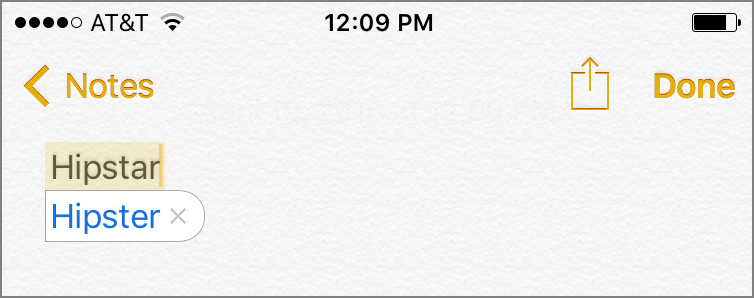UITextChecker
Make no mistake, a tiny keyboard on a slab of glass doesn’t always lend itself to perfect typing. Whether for accuracy or hilarity, anyone typing on an iOS device notices when autocorrect steps in to help out. You might not know, however, that UIKit includes a class to help you with your user’s typing inside your app.
First introduced in iOS 3.2 (or should we call it iPhone OS 3.2, given the early date?), UIText does exactly what it says: it checks text. Read on to learn how you can use this class for spell checking and text completion.
Spell Checking
What happens if you mistype a word in iOS? Type “hipstar” into a text field and iOS will offer to autocorrect to “hipster” most of the time.

We can find the same suggested substitution using UIText:
import UIKit
let str = "hipstar"
let textNSString *str = @"hipstar";
UITextThe returned array of strings might look like this one:
["hipster", "hip star", "hip-star", "hips tar", "hips-tar"]
Or it might not—UIText produces context- and device-specific guesses. According to the documentation, guesses “returns an array of strings, in the order in which they should be presented, representing guesses for words that might have been intended in place of the misspelled word at the given range in the given string.”
So no guarantee of idempotence or correctness, which makes sense for a method with guesses... in the name. How can NSHipsters trust a method that changes its return value? We’ll find the answer if we dig further.
Learning New Words
Let’s assume that you want your users to be able to type "hipstar" exactly. Let your app know that by telling it to learn the word, using the UIText class method:
UIText[UIText"hipstar" is now a recognized word for the whole device and won’t show up as misspelled in further checks.
let misspelledNSRange misspelledAs expected, the search above returns NSNot, for UIText has learned the word we created. UIText also provides class methods for checking and unlearning words: UIText and UIText.
Suggesting Completions
There’s one more UIText API, this time for finding possible completions for a partial word:
let partial = "hipst"
let completions = textNSString *partial = @"hipst";
NSArray *completions = [textcompletions gives you an array of possible words from a group of initial characters. Although the documentation states that the returned array of strings will be sorted by probability, UIText only sorts the completions alphabetically. UIText’s OS X-based sibling, NSSpell, does behave as it describes.
You won’t see any of the custom words you’ve taught
UITextshow up as possible completions. Why not? Since vocabulary added viaChecker UITextis global to the device, this prevents your app’s words from showing up in another app’s autocorrections.Checker.learn Word(_:)
Building an app that leans heavily on a textual interface? Use UIText to make sure the system isn’t flagging your own vocabulary. Writing a keyboard extension? With UIText and UILexicon, which provides common and user-defined words from the system-wide dictionary and first and last names from the user’s address book, you can support nearly any language without creating your own dictionaries!